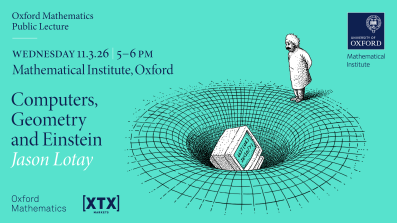11:00
Further birational non-expansion
Abstract
17:00
Computers, Geometry and Einstein - Jason Lotay
Computers have long been useful for studying mathematical problems. But recently computer techniques have been used to prove new theorems in geometry, specifically related to the study of gravity through Einstein's theory of General Relativity. This talk will describe these developments and what they might mean for the future.
Jason Lotay is Professor of Mathematics in the Mathematical Institute at the University of Oxford, and one of the inaugural Fellows of the Academy of Mathematical Sciences.
Please email @email to register to attend in person.
The lecture will be broadcast on the Oxford Mathematics YouTube Channel on Wednesday 25 March at 5-6 pm and any time after (no need to register for the online version).
The Oxford Mathematics Public Lectures are generously supported by XTX Markets.


